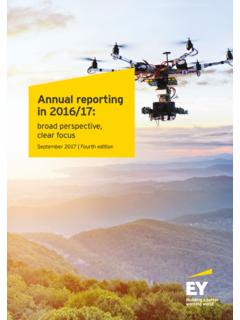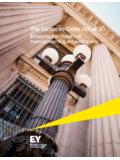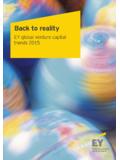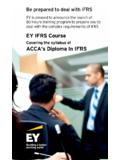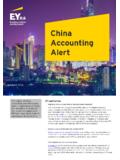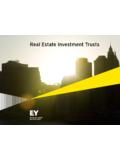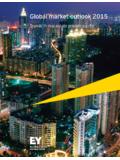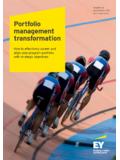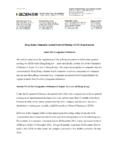Transcription of Hong Kong Tax Alert - EY - United States
1 12 January 2018 2018 Issue No. 3 hong kong Tax AlertIn the 2017 annual meeting between the IRDthe hong kong Institute of Certified Public Accountants (HKICPA), issues discussed tax treatment of interest earned by a non-resident bond fund; tainting effect which a single non-specified transaction would have on the otherwise tax exempt income derived from specified transactions undertaken by a non-resident private equity (PE) fund; tax treatment of lease payments incurred by a lessee under a new accounting standard; the conversion of a general legal practice into a limited liability partnership would be treated as a continuation of business; stamp duty group relief previously granted would be withdrawn where the transferee company amalgamates into the transferor company, or another group company, within 2 years from the date of a relevant transaction.
2 Clients who have questions on the views expressed by the IRDin the meeting , or would like to discuss in greater detail how such views might impact on their business operations, should seek professional tax advice. The Inland Revenue Department (IRD) States its views on certain profits tax and stamp duty issues2 hong kong Tax AlertInterest income of a bond fund exceeding the 5% threshold would be chargeable to tax in hong kong In interpreting the relevant tax provisions for the exemption of non-resident funds in hong kong , the IRDhas taken the view that interest earned in respect of bonds or notes etc. could only be regarded as income incidental to a specified this context, the specified transaction refers to the buying and selling of the bonds or notes concerned.
3 The IRDconsiders that the holding of the bonds or notes after they are purchased which gives rise to the interest income, is a separate transaction incidental to the specified transaction. Being only regarded as income from an incidental transaction but not income from the specified transaction itself, the exemption of such interest income (if otherwise taxable in hong kong ) will be subject to a 5% threshold test. In other words, such interest income will only be tax exempt in hong kong if it does not exceed 5% of the relevant total income of the non-resident fund. Otherwise, such interest income in total will be fully chargeable to tax in hong kong . Because the interest income of a bond fund for any one year may likely exceed the 5% threshold, the HKICPA expressed concern that the above interpretation adopted by the IRDmay subject many bond funds to tax in hong kong .
4 Given the above, and in view of the growing popularity of bond funds, the HKICPA asked whether the IRDwould consider adopting a more liberal approach to interpreting the relevant tax provisions, or consider amending the definition of specified transactions in order to address such concerns. The IRDhowever stated that its above interpretation was in line with the legislative intent when the law was enacted in 2006. Given that there has been no change in the legislative intent since the date of enactment, the IRDdid not find it appropriate to deviate from its current interpretation of the relevant tax provisions. The IRDadded that even though the Commissioner of Inland Revenue was empowered to amend the definition of specified transactions , any such changes would require justifications and in-depth policy consideration.
5 There was no current plan to make such a move to address such effect a single non-specified transaction would cause income derived from specified transactions of a PE fund to be chargeable to tax in hong kong when such income would otherwise be exemptA non-resident ( , offshore) PE fund which carries on business in hong kong would be tax exempt in hong kong provided that the fund only undertakes certain specified transactions (including deriving income from incidental transactions, subject to the 5% threshold discussed above). Such specified transactions could either be undertaken directly by the PE fund itself, or undertaken through a special purpose vehicle (SPV) company owned by the PE fund. For PE funds, specified transactions include transactions in certain excepted private companies (EPCs).
6 An EPC is defined as a private company incorporated outside hong kong which does not, directly or indirectly, carry on business in hong kong through a permanent establishment in hong kong or own any immovable property in hong kong , subject to a 10% exception threshold. Such qualifying conditions for an EPC have to be satisfied at all relevant times during a 3-year look-back period from the date the private company concerned is disposed the legislative provisions are clear as regards the tainting effect where all transactions are undertaken directly by a fund itself, there is less clarity where the relevant transactions are undertaken by SPVs owned by the fund, instead of by the fund itself. For example, it may not be so clear whether one transaction in a non-EPC ( , a non-specified transaction) undertaken by an SPVwould taint or render chargeable to tax in hong kong the otherwise tax-exempt income derived from transactions in EPCs( , specified transactions) undertaken by other SPVs.
7 The HKICPA sought clarification from the IRDon this point. The IRDindicated that it should be clear that a transaction by a PE fund in an overseas private company, directly or indirectly held, which failed to qualify as an EPC, would taint the exemption status of both the PE fund and the SPVsconcerned. The HKICPA then expressed its concern that such a strict interpretation of the tainting effect of the legislative provisions would be onerous and adversely affect the attractiveness of hong kong s offshore PE fund regime vis- -vis Singapore in particular. The HKICPA considered that it would be fairer if PE funds which carried on both specified and non-specified transactions were chargeable to tax in hong kong in respect of income derived from the latter only.
8 This would particularly be the case given that PE funds often do not have sufficient control over the business operations of their investee companies. As a result, PE funds may be unable to ensure that each one of their portfolio investment would necessarily satisfy the qualifying conditions for an EPC throughout the 3-year look-back kong Tax AlertWhilst duly noting these concerns, the IRDstated that its duty was to administer the law as it was and not what the IRDwished it to be. As such, there was no room for the IRDto relax the tainting effect by only subjecting to tax income derived by a PE fund from non-specified transactions, whilst treating as tax exempt income derived from specified transactions. Nonetheless, the IRDindicated that the tainting effect should be applied on a year by year basis.
9 Furthermore, to address the industry s concerns over the tainting effect, the legislative bill for the tax exemption of resident open-ended fund companies (OFCs) would allow OFCsto invest in non-permissible asset classes, subject to a 10% exception threshold. Tax treatment for leases not affected by new accounting standard HKFRS16 The new hong kong Financial Reporting Standard (HKFRS) 16 in respect of Leases issued in 2016 will eliminate the distinction by a lessee of a lease as being an operating lease or a finance lease. Instead, HKFRS16 introduces a single lessee accounting model under which all leases will be treated similar to a finance lease under the existing hong kong Accounting Standard (HKAS) 17. Under HKFRS16, the balance sheet of the lessee will recognize a right-of-use asset representing their right to use the underlying leased asset and a lease liability representing the present value of the future lease payments that the lessee is obliged to pay.
10 Depreciation of the leased asset ( , the right-of-use asset) and interest on the lease liability will be charged to the profit and loss account of the new HKFRS16 will be effective for annual periods beginning on or after 1 January 2019, but early adoption is permitted for entities under certain conditions. The HKICPA sought the IRD sview on the relevant tax treatment of lease payments incurred by a lessee under the new HKFRS16 where such payments were for the production of profits chargeable to tax in hong IRDstated that tax deductions for lease payments incurred by a lessee were governed by sections 16 and 17 of the Inland Revenue Ordinance (IRO). As such, If the lease payments were in the nature of rental for the use of the leased asset only (as often the case under a typical operating lease under the current HKAS17), the lessee should be entitled to tax deductions in respect of the lease payments.
